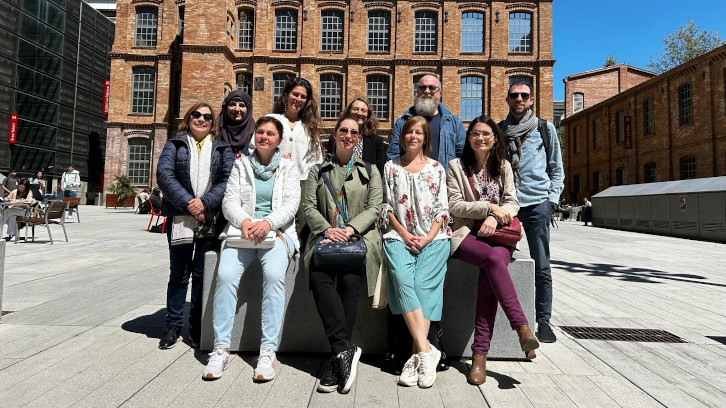Transnational Meeting of the FLeD project: a milestone in European educational collaboration

The FLeD project, with the participation of six European universities, including UAB, concluded its Transnational Meeting in Barcelona. Important advances were presented, such as innovative pedagogical resources, the successful implementation of a pilot plan and the "FLeD Tool", highlighting international collaboration and educational inclusion.
The FLeD project consortium (Learning design for flexible education), composed of six leading European universities—Universitat Autònoma de Barcelona (Spain), Sofia University (Bulgaria), Pompeu Fabra University (Spain), Università di Trento (Italy), Universitetet i Stavanger (Norway) and Universidade Aberta (Portugal) —successfully concluded its Transnational Meeting, held on April 16 and 17 at Universitat Pompeu Fabra. With the participation of 14 professors on the first day and 11 on the second, this event marked a milestone in international collaboration for educational innovation.
During this meeting, the significant progress achieved by the FLeD project to date was presented. Among these achievements were the creation of innovative pedagogical resources, the successful implementation of a pilot plan, and the development of the "FLeD Tool", as well as the wide dissemination of these advances through various dissemination channels.
The valuable contribution of teachers from multiple educational levels was especially highlighted, as well as the positive reception of the dissemination activities by the Spanish Service for the Internationalization of Education (SEPIE).
In the pedagogical phase, 5 open resources have been generated, available in the "Project Development" section of the project website, along with their respective links. In the pilot phase, 21 pairs of teachers participated and designed their flexible learning scenarios using the FLeD tool. As part of the dissemination strategy, 11 blog posts related to the project were published and future seminars and webinars were planned to broaden its impact.
A central aspect of the meeting was the evaluation of inclusivity, exploring different approaches to ensure the integration of students with special educational needs. This included pre- and post-pilot surveys to measure the impact of the initiatives implemented.
Below are the resources created so far:
1. Inverted learning pattern with scaffolding:
- Key Decisions for an Effective Flipped Classroom: Access
- Self-regulation and prior preparation in online flipped classrooms: Access
- Regulation and team management in mixed flipped classrooms: Access
- Constructive feedback exchange in face-to-face flipped classrooms: Access
- Glossary for FLeD Patterns: Access
- Scaffolding Document: Access
2. Experience of playful co-design for teachers:
- Open resource for teachers' interaction with the pattern and scaffolding: Access
3. FLeD Digital Tool:
- Tool for Flipped Learning Design: Access
4. Additional results:
- Manual “Better If”: Acceder
- Conceptual Framework for Flexible Learning Design: Access
- Inclusion Guidelines Manual: Access
Looking ahead, we will translate the FLeD tool into all project languages as well as the generated resources by December 2024. The next transnational meeting and multiplier event will take place in April 2025.
The FLeD Transnational Meeting has been instrumental in aligning strategies and ensuring continued progress towards our goals, focused on facilitating the design of flexible and effective learning scenarios for teachers. This effort seeks to guide the implementation of the flipped classroom model through the use of digital pedagogies and technologies, thereby promoting a sustained shift toward flexible education.
The team from the Universitat Autònoma de Barcelona is made up of five professors from the Department of Educational Theories and Social Pedagogy of the Faculty of Educational Sciences: Ingrid Noguera Fructoso (PI of the project, Serra Húnter lecture), Laura Arnau Sabates (full professor), Paloma Valdivia Vizarreta (Serra Húnter lecture), Paloma Sepúlveda Parrini (doctoral) and Claudia Maria Paredes Guinand (postdoctoral).
Translated with DeepL.com (free version)
Visit our website: https://fledproject.eu/
Paloma Valdivia Vizarreta
Department of Educational Theories and Social Pedagogy
Area of ¿¿Theory and History of Education
Universitat Autònoma de Barcelona


